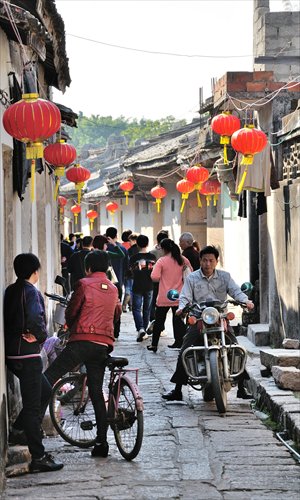When home no longer beckons

People walk on the streets of Longhu, an ancient village in Chaozhou, Guangdong Province, on Monday. The village dates back to the Southern Song Dynasty (1127-1279). Photo: CFP
My hometown, Xinhui, in Jiangmen, South China's Guangdong Province, is the kind of place where you can see people wearing T-shirts in winter. It was especially common this year, as the temperature during Spring Festival hovered at around 26 C. Instead of worrying about global warming, people were happy to have another warm winter.
Xinhui is a small district, with a population of 735,000, about 99.9 percent of whom are Han people. Situated in the southwest of the Pearl River Delta, Xinhui adjoins Hong Kong and Macao. But I had never met a foreigner or a non-Han person before I turned 18.
Like Beijingers and Shanghainese, people in Guangdong, a province that benefited significantly from the reform and opening-up policy, have a strong sense of their own importance. They consider everywhere else besides Guangdong to be "the North" and everyone from outside the province to be a "Northern barbarian."
However, that term has faded from use as more and more people have come down to the province to seek their fortunes over the years. As a result, local people have come to realize that people outside of Guangdong are just as "civilized" as they are.
The semi-official language is Cantonese, and I could not speak Putonghua until I went to college. Now, wherever I go, I can hear people speaking in Putonghua. Still, pride runs so deep that they leave "dirty" jobs such as being a caretaker or street cleaner to outsiders.
Xinhui is also the kind of place I always wanted to get away from as a teenager. I wanted to go somewhere more cultured and developed, somewhere like Beijing.
I eventually did.
The thought of leaving Xinhui rarely crossed my friends' minds during our childhoods. Even though they went to college outside Guangdong, they eventually came back. For them, this place remains a safety net in life. They have family to take care of them, they have friends to hang out with, and more importantly, they have connections there. Everyone knows everyone else. Life can be very easy. The policeman that gave you a ticket could possibly be the guy you went to high school with. The doctor that you see might be the one who sat next to you in chemistry class.
The district still has some charms. It is booming in a "Guangdong minute." The downtown I remember was no more than a single street filled with storefronts. Now it has been replaced by new shopping malls, markets and shops. We did not have any McDonalds or KFC outlets until I went to college in 2001. The landscape changes yearly. A new shopping mall here, a new cinema there. It has changed so much that I feel like a tourist whenever I return to this place called home. If it's any consolation, McDonalds and KFC are still in the same places, years later.
You can still find a lot of odd things in Xinhui: Only students under 18 ride bicycles; for everyone else it's a motorbike. Even though most of the places are walking distance, people are too lazy to walk. In big cities like Beijing motorbikes are not allowed on roads, in Xinhui they are everywhere, coming from every direction. It often takes me forever to cross the road. Traffic lights? Yes. Follow traffic lights? No.
Ever since I left home when I was 19, I have come home only once or twice a year. Whenever I do, I feel completely disconnected from that place. I could not carry on a conversation with friends who spend most of their time there; I constantly get lost in my ever-changing hometown. What is home? Home is where work is, which gives me a rather bittersweet feeling.